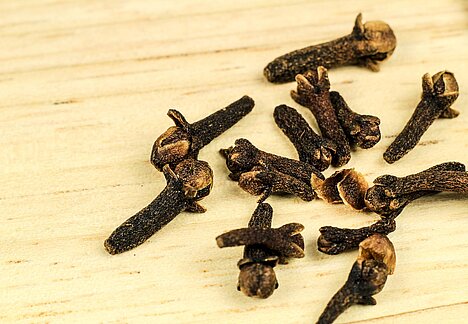Clove oil

Clove oil is an essential oil extracted from the flower buds of cloves. It has a spicy and sweet scent and is often used in cooking, cosmetics and medicine. But is clove oil also suitable for dogs? In this article, you will find out what clove oil can do for dogs and what you should look out for.
The benefits of clove oil for dogs
Clove oil has a number of positive properties that can also benefit dogs. For example:
- Clove oil has antibacterial, antiviral and antifungal properties. It can therefore help to prevent or treat infections, for example wounds, gum infections or ear infections.
- Clove oil has an analgesic and anti-inflammatory effect. It can therefore be used to treat pain or discomfort in the mouth or throat, for example toothache or sore throat.
- Clove oil has a calming and relaxing effect. It can therefore help with stress or anxiety, for example with motion sickness or fireworks.
The disadvantages of clove oil for dogs
However, clove oil is not without risks for dogs. For example:
- Clove oil is very concentrated and can cause skin irritation or burns if used incorrectly. It should therefore always be diluted before it is applied to the skin.
- Clove oil can cause allergic reactions in sensitive dogs. It should therefore always be tested on a small area first before being applied to a large area.
- Clove oil can lead to poisoning if ingested excessively. It should therefore never be administered orally unless prescribed by a vet.
How to use clove oil for dogs correctly
If you want to use clove oil for your dog, there are a few important points to bear in mind:
- Only use pure and high-quality clove oil from organic farming. Avoid synthetic or perfumed oils, which may contain harmful additives.
- Always dilute the clove oil with a carrier oil, for example coconut oil or almond oil. The recommended dilution rate is around 0.5 percent, i.e. one drop of clove oil to 10 milliliters of carrier oil.
- Only apply the diluted clove oil to the affected areas and avoid contact with the eyes or mucous membranes. Use a cotton pad or cotton bud for this.
- Only apply the clove oil for a short time and monitor your dog for possible side effects.
Clove oil can have some benefits for dogs, but also some disadvantages. It should therefore always be used with caution and in consideration of your dog's individual needs.
If you notice any signs of hypersensitivity or poisoning in your dog, you should see your vet immediately. We are not a substitute for a vet, but we try to be as accurate as possible. Every dog reacts differently and we recommend you get a second opinion or consult your vet if in doubt.
Stay healthy and take good care of your four-legged friend!😊
Similar to Clove oil
An essence with a historyCinnamon oil is obtained by steam distillation of cinnamon bark and contains numerous bioactive components, including cinnamaldehyde, which is responsible for the...
Nutmeg oil is obtained by steam distillation of the ground seeds of the nutmeg fruit, Myristica fragrans. This essential oil is known for its characteristic warm, spicy scent and is used in...
Cardamom oil is extracted by steam distillation from the small, green seeds of the cardamom plant. It is known for its unique aroma, which is often used in cooking for desserts, tea and coffee. In...
Ginger oil is an essential oil obtained by steam distillation from the root of ginger (Zingiber officinale). It contains a variety of bioactive compounds, including gingerols, shogaols and...



